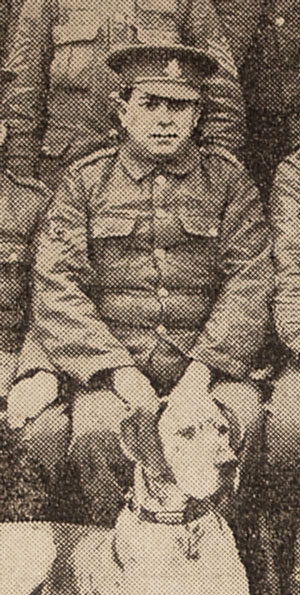Farrier-Sergeant William James McMichael

William James McMichael was born on 13 October 1873 at Glenmanus, Portrush, County Antrim, the first of at least twelve children of blacksmith James McMichael and his wife Mary (nee Drain). On 30 May 1897 he married Agnes McKervill at St Patrick's Church in Ballymena. At the time he was living at 2 Park Street, Ballymena, and working as a horse-shoer.
By 1901 McMichael had moved with his family to Belfast, living at 137.2 Cosgrove Street. Later that year, however, he enlisted in the 131st (Irish Horse) Company, 29th Battalion, Imperial Yeomanry (No.44804), seeing service as a shoeing smith with the regiment in the Boer War. After his discharge at the end of the war, McMichael returned to work as a blacksmith in Belfast.
McMichael and his wife Agnes had five children, but in May 1907 she died following the premature birth of their daughter Mary. By 1911 he was living with his four surviving children at 4 Canning Street.
McMichael enlisted in the North Irish Horse on 10 October 1914 (No.1300 – later Corps of Hussars No.71326). He claimed to be 33, eight years less than his true age, but it was most likely his trade, vital in a cavalry regiment, that ensured he was accepted.
McMichael embarked for France with D Squadron on 1 May 1915. He must have returned home within the next year, however, for on 3 June 1916 he married Agnes Mackey at Ravenhill Presbyterina Church, Belfast.
Whether he saw further service overseas is not known for certain. On 24 February 1919 he was discharged as being no longer physically fit for military service, and surplus to military requirements, having suffered impairment since entry into the service (paragraph 392 xvi(a), King's Regulations). The newspaper article below gives some clue as to the nature of his impairment.
McMichael died at his home, 20 Hamilton Place, Portrush, on 27 November 1927. The Northern Whig and Belfast Post reported that:
McMichael ... had served throughout the Boer war and the great war, receiving in the latter wounds which left both his arms paralysed. Mr. McMichael was elected to the Urban Council three years ago, and was particularly concerned in the cause of the ex-service man. He was also interested in sport. At special meetings of the Urban Council and the British Legion resolutions of condolence were passed, and both these bodies will attend the funeral to Ballywillan to-day.
The image of McMichael above, taken in late 1914, can be seen in its full context here.
